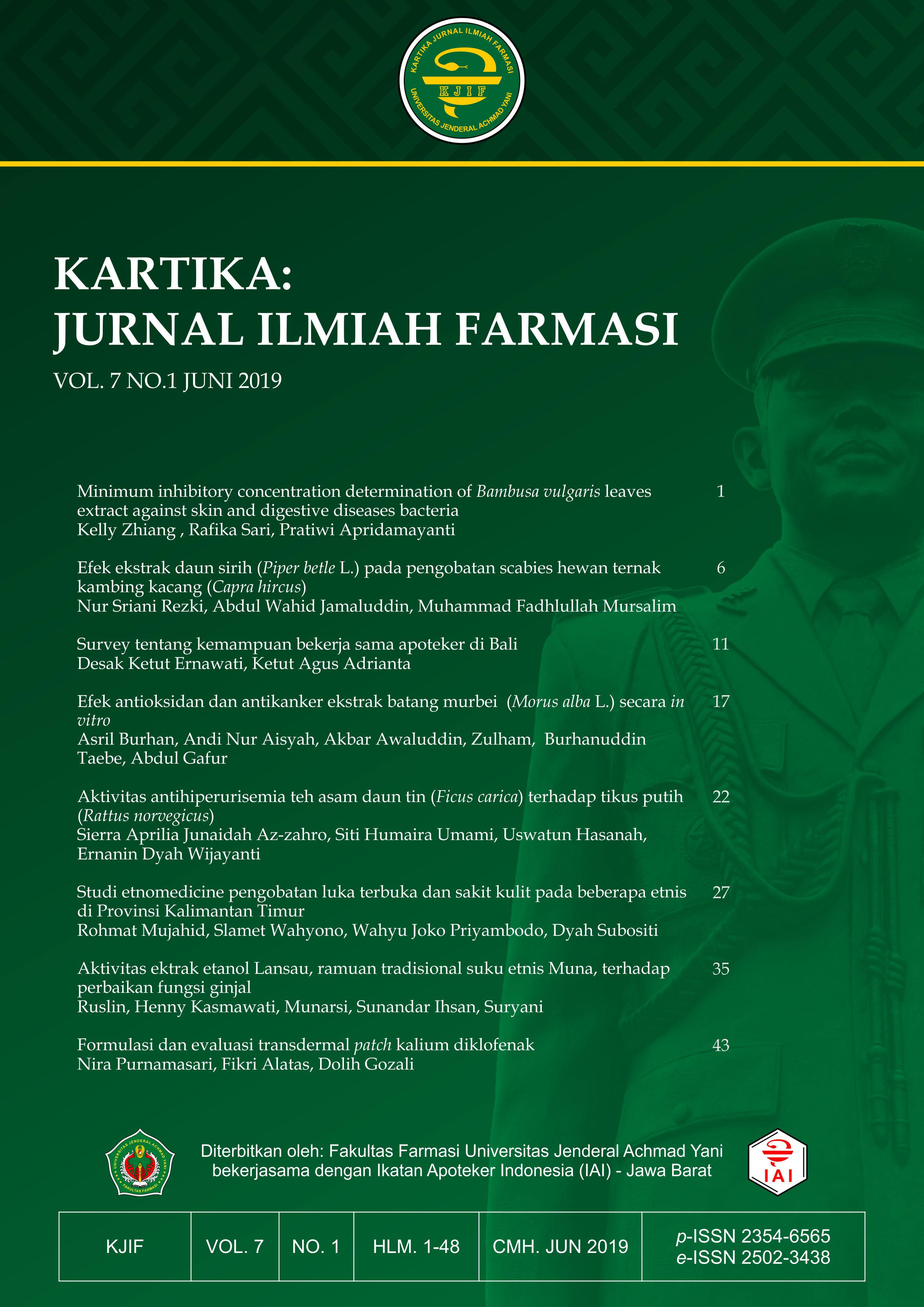SURVEY TENTANG KEMAMPUAN BEKERJA SAMA APOTEKER DI BALI
DOI:
https://doi.org/10.26874/kjif.v7i1.171Abstrak
Abstrak
Â
Tenaga kesehatan diharapkan mampu bekerja sama dengan profesi lain pada pelayanan kesehatan sehingga kurangnya kemampuan bekerja sama dapat menghambat pelayanan kesehatan yang efektif. Penelitian ini dilakukan untuk mengetahui pemahaman apoteker dalam bekerja sama dengan profesi lain. Penelitian merupakan penelitian potong selintang dengan menggunakan survey kolaborasi yang terdiri dari 13 pernyataan tentang pemahaman kemampuan bekerja sama yang diberikan skala dari tidak ada sampai sangat baik (1-5). Faktor yang diteliti adalah pengetahuan dan ketrampilan bekerja sama. Survey menggali hal-hal yang dibutuhkan oleh apoteker dalam bekerja sama dengan profesi kesehatan lain dan hambatan apoteker dalam bekerja sama dengan profesi lain. Survey diberikan kepada seluruh apoteker yang menghadiri Konferensi Daerah di Bali pada pertengahan Tahun 2018. Data dianalisa dengan menggunakan SPSS versi 22. Total responden yang mengikuti survey adalah 274, 52,8% responden bekerja di apotek, 24,7% bekerja di dan 5% bekerja di klinik. Analisis Anova menunjukkan terdapat perbedaan bermakna dalam pengetahuan (p=0,001) dan ketrampilan dalam bekerja sama (p=0,03) berdasarkan tempat bekerja. Hasil kualitatif diperoleh hasil bahwa hal yang dianggap penting oleh apoteker dalam berkolaborasi antara lain kemampuan berkomunikasi, adanya wadah untuk berkomunikasi serta pemahaman tentang peranan tugas dan tanggungjawab profesi lain sehingga kurangnya hal l tersebut merupakan faktor penghambat kemampuan bekerja sama dengan profesi lain. Disarankan dimasa depan diperlukan kegiatan yang dapat meningkatkan kemampuan bekerja sama antar profesi kesehatan. Â
Â
Kata kunci: Apoteker, ketrampilan, pengetahuan bekerja sama
Â
A survey of collaborative competencies amongst pharmacist in Bali
Â
Abstract
Â
Healthcare professional are expected to be able to work together with other professions in the health service. So that the lack of ability to work together can hamper effective health services. This research was conducted to determine the understanding of pharmacists in collaboration with other professions. The research is a cross-sectional study using a collaborative survey consisting of 13 statements about understanding the ability to work together given a scale from none to very good (1-5). The factors studied are the knowledge and skills to work together. The survey explores the things needed by pharmacists in working with other health professions and the obstacles of pharmacists in working with other professions. The survey was given to all pharmacists who attended the Regional Conference in Bali in mid-2018. Data were analysed using SPSS version 22. Total respondents who took the survey were 274, 52.8% of respondents worked in pharmacies, 24.7% worked in and 5% work in the clinic. Anova analysis showed that there were significant differences in knowledge (p = 0.001) and skills in working together (p = 0.03) based on the place of work. Qualitative results obtained result that what is considered important by pharmacists in collaboration include the ability to communicate, the existence of a place to communicate and an understanding of the role of duties and responsibilities of other professions so that this lack of l is an obstacle to the ability to cooperate with other professions. It is suggested that in the future activities are needed that can improve the ability to work together between healthcare professional.
Keywords: Knowledge in collaboration; skills in collaboration; pharmacist
Referensi
Baerg, K., Lake D & T., P. 2012. Survey of interprofessional collaboration learning needs and training interest in health professionals, teachers, and students: an exploratory study. JRIPE, 22.
Bosch, B., & Mansell, H. 2015. Interprofessional collaboration in health care: Lessons to be learned from competitive sports. Can Pharm J (Ott), 148, 176-9.
Canadian Interprofessional Health Collaborative. 2010. A national interprofessional competency framework. Canada.
Frenk, J., Chen, L., Bhutta, Z.A., Cohen, J., Crips, N., Evans, T., Fineberg, H., Garcia, P., KE, Y., Kelley, P., Kistnamasy, B., Meleis, A., Naylor,D., Pablos-Mendez, A., Reddy, S., Scrimshaw, S., Sepulveda, J., Serwadda, J., & Zurayk, J. 2010. Health professionals for a new century: transforming education to strengthen health systems in an interdependent world. The Lancet, 376.
Ikatan Apoteker Indonesia. 2017. Standar Kompetensi Apoteker Indonesia. Jakarta.
Jogerst, K., Callender, B., Adams, V., J, E., E, E. F. & HALL, T. 2015. Identifying interprofessional global health competencies for 21st-century health professionals. . Ann Glob Health, 81, 239-47.
World Health Organisation 2010. Framework for Action on Interprofessional Education and Collaborative Practice. Geneva: WHO.
##submission.downloads##
Diterbitkan
Cara Mengutip
Terbitan
Bagian
Lisensi
Penulis yang menerbitkan artikel pada jurnal ini menyetujui ketentuan berikut:
- Penulis memberikan hak cipta dan jaminan atas artikel sebagai publikasi pertama, yang memberikan kesempatan pada orang lain untuk membagi artikel dibawah lisensi Creative Commons Attribution License
- Penulis dapat melakukan perubahan dan menambahkan untuk pendistribusian artikel yang terpublikasi secara non eksklusif (misalnya, mempostingnya ke repositori institusional atau mempublikasikannya dalam sebuah buku), dengan pengakuan publikasi awal dalam jurnal ini.
- Penulis diizinkan dan didorong untuk memposting pekerjaan mereka secara online (misalnya, di repositori institusional atau di situs web mereka) sebelum dan selama proses pengajuan, karena dapat mengarah pada pertukaran produktif, serta kutipan pekerjaan sebelumnya dan lebih besar yang diterbitkan (Lihat The Effect of Open Access).























